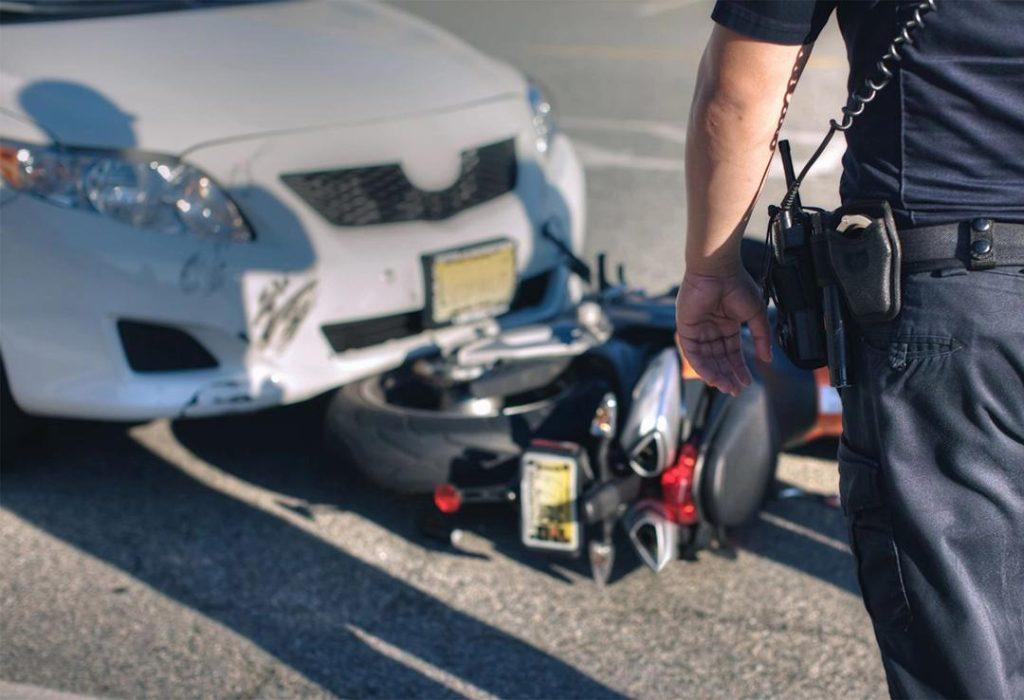Auto accidents involving motorcycles have unique risks and implications. Not only are there different medical concerns when a motorcycle and car are involved in an accident, but there are also legal concerns too. A car is fully enclosed with many safety precautions added in the event of an accident. Where a motorcycle is only as protected as the driver is wearing proper protective equipment. Serious or fatal injuries can occur if a motorcyclist isn’t wearing the proper protection, like a helmet. Navigating the aftermath of a motorcycle and car accident can be complex. Let’s talk about the legal and medical implications surrounding a motorcycle and car accident.

Immediate Actions After an Accident
After an accident, you should always call the police. Regardless of the type of accident, calling the police or 911 will create a report and will help the beginning steps of insurance claims and legal actions.
Taking photos and videos of the scene and vehicle damages, getting witness accounts, and documenting personal injuries is vital for your claims. When possible, swap names, contact numbers, and insurance details with the other party. In some states, this step is completed by the police. If at any point you do not feel safe with the other party or you can’t physically move or have a conversation with them, it is best to stay where you are at so you don’t cause further medical concerns.
Once everything is completed by the officials and first responders, it is important for you to seek medical attention immediately following the accident. Motorcycle accidents often result in more severe injuries due to lack of protection. In 2020, there were 600 reported motorcycle accidents within Florida and 18% of those accidents involved fatalities.
Medical Implications
Motorcycle accidents often lead to more severe injuries compared to car accidents. Motorcycle riders are 28 times more likely to lose their life in a fatal driving crash when involving a car. Fatal or serious injuries can include head trauma, spinal injuries, fractures, road rash, loss of consciousness and more. These injuries decrease in fatality rate as the motorcyclist is more protected by proper, DOT-Compliant, gear.
Safety and Liability Considerations
1. Safety Gear: Motorcyclists should always wear helmets and protective gear. This can significantly reduce the severity of injuries in an accident.
2. Liability Insurance: Ensure you have adequate insurance coverage. This includes liability, collision, and uninsured motorist coverage to protect against various scenarios.
Legal Implications
Fault in motorcycle accidents can be more complex due to road conditions, visibility, time of day and weather. Unfortunately, more than a third of motorcyclist accidents involve unlicensed individuals. All states require some sort of licensing to drive a motorcycle, which includes driving and written tests, just like getting a driver’s license.
Some states follow Comparative Negligence, or a variation of it. This means that compensation is adjusted based on the percentage of negligence. Some states even follow the 51 Percent Bar Rule, which states if you are at least 51% at fault, you cannot receive compensation. This impacts the payout from insurance claims.
Motorcycle accidents are far more complex than car-only accidents. Seeking legal advice is often beneficial. Your attorney can help navigate insurance claims and legal proceedings, which allows you to focus on getting better after an accident.
Choosing the Right Lawyer
Look for a lawyer with experience in handling motorcycle accidents. Many work on a contingency fee basis, meaning you pay only if you win. Understand their fees and be aware of any deadlines for filing claims.
What to do After a Motorcycle Accident
1. Call the Police: Regardless of whether it’s a motorcycle or car accident, calling the police is crucial. They will document the incident, which is necessary for insurance claims and legal actions (Forbes).
2. Gather Evidence: Capture the scene, vehicle damage, and any visible injuries. Documentation is vital for both medical and legal purposes (Forbes).
3. Exchange Information: Swap names, contact numbers, and insurance details with the other party. In some areas, the police may handle this, so confirm the procedure in your state (III).
4. Seek Medical Attention: Even if injuries seem minor, see a doctor immediately. Motorcycle accidents often result in more severe injuries due to the lack of protection (Forbes).
5. Obtain the Police Report: Ensure that you get a copy of the police report or are provided a case number so that you have proper documentation for insurance claims and legal needs.
6. Obtain Legal Representation: Given the complexity of motorcycle accidents, seeking legal advice is often beneficial. Lawyers can help navigate insurance claims and any legal proceedings.
7. Submit all Documentation: Insurance companies need documentation from doctor’s visits, medical bills, and police reports. Providing detailed and accurate information will help your case move quicker.
How 1-800-ASK-GARY® Can Help
At 1-800-ASK-GARY, we’ve been assisting accident victims for over 25 years, connecting them with experienced doctors and lawyers. Here’s what we offer:
- Free consultations with medical and legal professionals.
- 24/7 support for accident and injury help.
- Guidance to ensure you receive proper care and compensation.
- Services are available in English and Spanish.
- Personalized assistance whenever you need it.
Conclusion
Motorcycle and car accidents present different challenges in terms of medical and legal implications. By understanding these differences and taking appropriate actions, you can better manage the aftermath of an accident. Remember, 1-800-ASK-GARY is here to provide expert guidance and support at any.
Sources:
